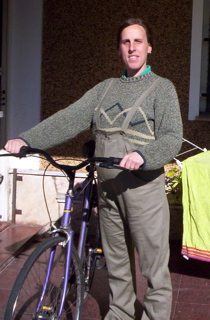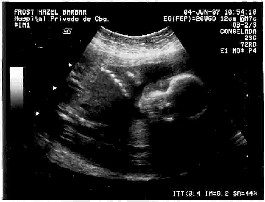Time for a new heresy. I think it’s a good thing to air our heresies, and I also think that we don’t do it enough. I suspect that the reason why we don’t do it enough is for fear of what the dear brethren might think of us. Such fear is a bad thing, since it denies us the opportunity to deal with our questions in daylight. Unfortunately, fear frequently turns out to be justified, since judgment and un-grace are heaped upon those perceived to be “not quite as saved / sound / sorted” as the self-appointed judges: “If grace is so amazing, why don’t Christians show more of it?” (Yancy, 1997).
At the moment in the Christian community, in the UK (don’t know if it’s happening in other places?) there is a brouhaha occurring on the subject of “substitutionary atonement”. As would be expected, the community has responded with its usual level of maturity, and is thus polarized between the red corner and the blue corner, having opted for war over dialogue. “Horsey” novelist Dick Francis once said:
“Entrenched belief is never altered by the facts” (Francis:”Hot Money”).
Without wishing to wade onto the battlefield, to which I could add very little anyway, an over-simplistic understanding of substitutionary atonement might go something like this. God is judge, and he judges us according to his standard, which happens to be perfection. Not surprisingly we all fall short of the mark, since we are characterised by imperfection, otherwise known as sin, and all sin matters. So all are deserving of punishment. However, God is love as well as judge, and having found us worthy of punishment, he also provides the solution. In the person of his son, Jesus Christ, he came to earth as a man and willingly took our punishment upon himself (hence “substitutionary”) and bore our sin’s condemnation in his own body on the cross. Thus judgment and love are inseparable in the act of the crucifixion.
The Bible tells us that Jesus was both fully God and fully human. This is important for thinking about substitutionary atonement. If we think about the analogy of a judge for a minute. A judge finds a person guilty and orders them to pay a fine. If the judge, instead of fining the guilty party, imposed the fine upon a random person who happened to be sitting in the courtroom, then that would be blatantly unjust and could not be interpreted as loving in any sense. However, if the judge fined the guilty party, but then undertook to pay the fine him/herself, then that could be interpreted as an act of love. Hence Jesus being fully God could choose to pay the “fine” himself on behalf of humanity, even though he owed nothing.
Now up to this point, I might not be the greatest theologian, and my understanding may be limited and simplistic, but, for my own purposes at least, I’m doing OK so far. Here’s where it goes wrong and the question kicks in. What is going on with that cross? At this point the judge analogy blows apart. The judge imposes a fine, and decides to pay same him/herself. S/he rises, crosses the courtroom, and to the bewilderment of all, and the gratitude of the defendant, hands the corresponding sum to the prosecution. Bows, applause, Daily Mail has a field day, all live happily ever after.
However, this analogy can only work if the judge and the plaintiff are separate entities. If the two were one and the same, then no money would actually change hands since the same person would both impose the fine and write it off. If the judge felt like it, they might take the money out of their wallet, hold it up to the court, and put it back in again to show the extent of the price paid, and forgiveness received. But this would be a symbolic demonstration, and not a necessary facet of the forgiveness itself.
Yet here we have God in the person of Jesus, both plaintiff and judge, succumbing to torture and execution, apparently in order to appease himself. How on heaven or earth does that work?
I don’t actually need an answer, or not this week anyway, which is fortunate since I don’t imagine I’m going to find one. What I am asking for is a space to think about it, and for any contributions that anyone wants to add to the soup. I suspect that this “God became a man” thing is too important to be tied up in crazy theories or boxing rings, and that we need to find other ways of living with it, and ultimately with Him:
“I am one of those who think it good that the church has never formally defined ‘the atonement’, partly because I firmly believe that when Jesus himself wanted to explain to his disciples what his forthcoming death was all about, he didn’t give them a theory, he gave them a meal” (Wright, NT: “The Cross and the Caricatures”, 2007)
 This baby has a lot to answer for, I had to take my bike in to the shop this week, and have my beloved racing-handlebars swopped for some upright ones because I can’t reach down to the brakes any more, which was starting to feel like a bit of a safety hazard for doing business with Cordoban drivers! So now I’m in “granny-sit up and beg” mode, but at least it means I can keep cycling for a while longer, hadn’t anticipated that consequence to my increasing fatness. I’ve also just bought a pair of dungarees, after completely running out of clothes that fit me.
This baby has a lot to answer for, I had to take my bike in to the shop this week, and have my beloved racing-handlebars swopped for some upright ones because I can’t reach down to the brakes any more, which was starting to feel like a bit of a safety hazard for doing business with Cordoban drivers! So now I’m in “granny-sit up and beg” mode, but at least it means I can keep cycling for a while longer, hadn’t anticipated that consequence to my increasing fatness. I’ve also just bought a pair of dungarees, after completely running out of clothes that fit me.
 I know, this is one of those “I believe it’s a baby because you tell me it is” sort of grainy black and white pics, which if we’re honest looks quite a lot like a bean, but really could be just about anything. This particular bean is ours, taken this morning. Almost definitely male, he is currently at four and a half months, with all limbs and vital organs in residence. This picture is his face, on the grounds that it is probably the one he will be the least embarrassed by when he’s fifteen.
I know, this is one of those “I believe it’s a baby because you tell me it is” sort of grainy black and white pics, which if we’re honest looks quite a lot like a bean, but really could be just about anything. This particular bean is ours, taken this morning. Almost definitely male, he is currently at four and a half months, with all limbs and vital organs in residence. This picture is his face, on the grounds that it is probably the one he will be the least embarrassed by when he’s fifteen.